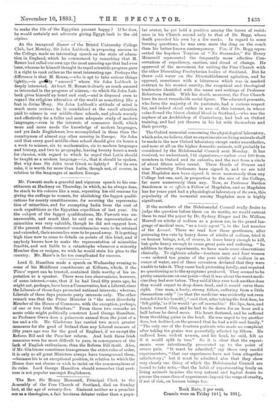If the members of the Hebdomadal Council really desire to
judge the question before them on its merits, we would entreat them to read the paper by Dr. Sydney Ringer and Dr. William
Murrell on nitrite of sodium as a poison (or, in the grand lan- guage of medical men, " as a toxic agent "), in the last number of the Lcriteet. There we read how these gentlemen, after poisoning two cats by heavy doses of nitrite of sodium, tried it on human beings, not, of course, iu doses heavy enough to kill, but quite heavy enough to cause great pain and suffering. " In addition to these experiments, we have made some observations clinically. To eighteen adults—fourteen men and four women —we ordered ten grains of the pure nitrite of sodium in an ounce of water, and of these seventeen declared that they were unable to take it. They came back protesting loudly, and required no questioning as to the symptoms produced. They seemed to bo pretty unanimous on one point—that it was about the worst medi- cine they had ever taken. They said if they ever took another dose they would expect to drop down dead, and it would serve them right. One man, a burly, strong fellow, suffering from a little rheumatism only " [so that the medicine was evidently not even intended for his benefit], " said that, after taking the first dose, he ' felt giddy,' as if he would ' go off insensible.' His lips, face, and hands turned blue, and he had to lie down for an hour and a half before he dared move. his heart fluttered, and he suffered from throbbing pains in the head. He was urged to try another dose, but declined, on the ground that he had a wife and family.' "The only one of the fourteen patients who made no complaint after taking ten grains was powerfully affected by fifteen. He suffered from violent nausea, and his head, he said, felt as if it would split in two." So it is clear that the experi- ments were intentionally prosecuted up to the point of severe pain. "It must be admitted," say these very candid experimenters, "that our experiences have not been altogether satisfactory ;" but it must be admitted also that they show very clearly one thing of which the Hebdomadal Council are bound to take note,—that the habit of experimenting freely on living animals inspires the very natural and logical desire to pursue the same class of experiments beyond the verge of cruelty, if not of risk, on human beings too.


































 Previous page
Previous page